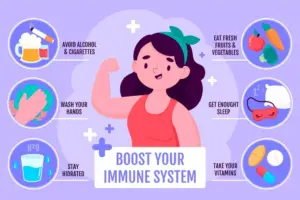Anaemia is a condition in which the body does not have enough red blood cells, which are responsible for carrying oxygen throughout the body.
There are several types of anaemia, including:
- Iron-deficiency anaemia: caused by a lack of iron in the diet or difficulty absorbing iron from food
- Vitamin B12 deficiency anaemia: caused by a lack of vitamin B12 in the diet or difficulty absorbing it
- Folate-deficiency anemia: caused by a lack of folate (a type of vitamin B) in the diet or difficulty absorbing it
- Anemia of chronic disease: caused by chronic illness such as cancer, kidney disease, or rheumatoid arthritis
- Hemolytic anemia: caused by the destruction of red blood cells
- Aplastic anemia: caused by the failure of the bone marrow to produce enough red blood cells
Causes of anaemia can include:
- Nutritional deficiencies, such as not getting enough iron, vitamin B12, or folate
- Chronic illnesses, such as cancer, kidney disease, or rheumatoid arthritis
- Blood loss, such as heavy menstrual bleeding or bleeding from the gastrointestinal tract
- Inherited blood disorders, such as sickle cell anemia or thalassemia
- Medications that can damage red blood cells
Symptoms of anaemia can include:
- Fatigue or weakness
- Pale skin
- Shortness of breath
- Rapid heartbeat
- Dizziness or lightheadedness
- Headaches
- Cold hands and feet
- Irritability or difficulty concentrating
Diagnosis of anaemia is usually made by a physical examination, an evaluation of medical history and blood test such as complete blood count (CBC) and other tests may be done to determine the cause of anaemia.
Treatment for anaemia will depend on the underlying cause. Some common treatments include:
- Iron supplements, vitamin B12 or folate supplements if the anaemia is caused by a deficiency.
- Medications to stop bleeding or reduce inflammation if the anaemia is caused by chronic illness or bleeding.
- Blood transfusions for severe anaemia or to treat certain types of anaemia
- Treating the underlying cause of anaemia, such as addressing a nutritional deficiency or treating a chronic illness.
It is important to note that anaemia can be caused by many different factors, and it’s crucial to determine the underlying cause in order to provide effective treatment.
To learn more about anaemia and types of it, please visit:
Dr Ibrahim Yahli MD MRCPsych



